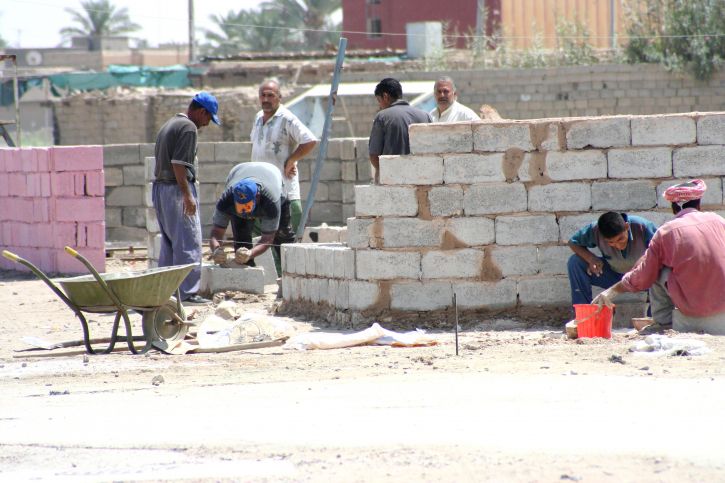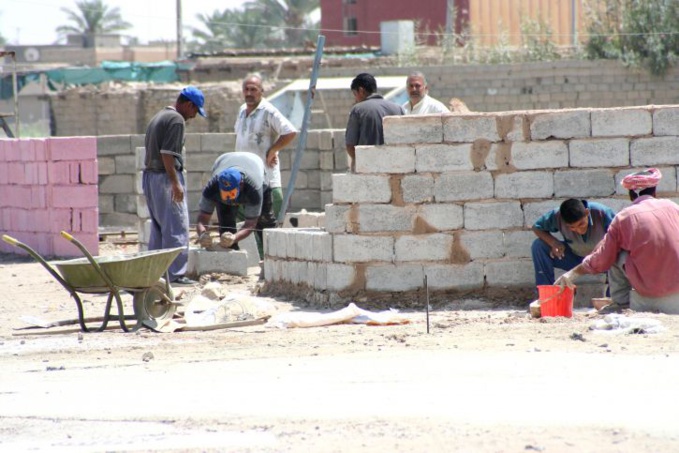Earlier this year, Iraq was torn by anti-corruption protests, yet now the political situation has become more stable. There has been a partial recovery in oil prices, on which the country's economy depends. In addition, the Iraqi army won several victories over ISIL, which continues to control only a few areas of the country.
Foreign capital also reflects changes in the country’s economy as the world’s companies are cautiously returning to Iraq in search of bargains. In January, General Electric (GE) has signed contracts for $ 1 billion for electricity infrastructure modernization. This is its largest such deal in Iraq since 2008. GE, which has worked in Iraq for many years, says that it "continues to see opportunities for growth in the future".
In April, the International Finance Corporation (IFC), a member of the World Bank, has agreed to provide $ 375 million of funding to support the Iraqi electric power company, backed up by Lebanese Audi Bank. Mouayed Makhlouf, MENA Regional Director of IFC is sure that the deal proves strong support of his company, and coincides with "growing interest of investors in the region".
Some companies even rely on tourism recovery. Wyndham Hotel Group is planning to open two new hotels in Najaf for Shiite pilgrims by 2018. According to Daniel Ruff, who manages the company's operations in the region, it is important to get ahead of the competition. "Construction of new hotels takes a lot of time, so you cannot wait until all tourism magazines start writing about this direction", - he said.
According to World Bank projections, Iraq's GDP may grow by about 7% this year thanks to boosted oil production, reforms and lower threat of Islamist attacks. Foreign direct investment, mostly from international oil companies, could rise by about 20% to $ 4 billion this year, an estimated by Astrit Sulstarova of the United Nations Conference on Trade and Development (UNCTAD). In 2015, foreign direct investment fell by 30% due to geopolitical uncertainties and dropped oil prices.
However, even despite of this, Iraq is still in a difficult situation. Price of oil, main source of the budget’s replenishment, remains low. It is expected that the country's budget deficit will increase from 14.3% of GDP in 2015 to almost 15% of GDP this year. Above that, the country is suffering from humanitarian crisis, which demands additional funds from the government. The UN estimates that more than 3 million people have been forced to flee their homes because of war with the ISIL. In addition, there are risks of new anti-corruption protests.
Companies also face significant obstacles in the form of excessive bureaucracy and rampant corruption. Launching a new business in Iraq requires about 10 procedures, and averagely takes a month, according to the World Bank. Therefore, the country ranks 161 out of 189 in its ranking of ease of doing business.
In addition, the Iraqi government itself seems quite disinclined to cooperation. According to Mohammed Al Khasaky of AKG Engineering Construction & Trading Group, a constructive conversation with the state is "impossible". His company, like many others, has not received a single cent from the government during more than a year. However, Al Khasaky still intends to continue to work in Iraq under condition that he would not depend on the government's money.
Sami al-Araji, chairman of Iraq's National Investment Commission, admits the problems. He claims he was looking for "any means to try to help companies solve them".
source: wsj.com
Foreign capital also reflects changes in the country’s economy as the world’s companies are cautiously returning to Iraq in search of bargains. In January, General Electric (GE) has signed contracts for $ 1 billion for electricity infrastructure modernization. This is its largest such deal in Iraq since 2008. GE, which has worked in Iraq for many years, says that it "continues to see opportunities for growth in the future".
In April, the International Finance Corporation (IFC), a member of the World Bank, has agreed to provide $ 375 million of funding to support the Iraqi electric power company, backed up by Lebanese Audi Bank. Mouayed Makhlouf, MENA Regional Director of IFC is sure that the deal proves strong support of his company, and coincides with "growing interest of investors in the region".
Some companies even rely on tourism recovery. Wyndham Hotel Group is planning to open two new hotels in Najaf for Shiite pilgrims by 2018. According to Daniel Ruff, who manages the company's operations in the region, it is important to get ahead of the competition. "Construction of new hotels takes a lot of time, so you cannot wait until all tourism magazines start writing about this direction", - he said.
According to World Bank projections, Iraq's GDP may grow by about 7% this year thanks to boosted oil production, reforms and lower threat of Islamist attacks. Foreign direct investment, mostly from international oil companies, could rise by about 20% to $ 4 billion this year, an estimated by Astrit Sulstarova of the United Nations Conference on Trade and Development (UNCTAD). In 2015, foreign direct investment fell by 30% due to geopolitical uncertainties and dropped oil prices.
However, even despite of this, Iraq is still in a difficult situation. Price of oil, main source of the budget’s replenishment, remains low. It is expected that the country's budget deficit will increase from 14.3% of GDP in 2015 to almost 15% of GDP this year. Above that, the country is suffering from humanitarian crisis, which demands additional funds from the government. The UN estimates that more than 3 million people have been forced to flee their homes because of war with the ISIL. In addition, there are risks of new anti-corruption protests.
Companies also face significant obstacles in the form of excessive bureaucracy and rampant corruption. Launching a new business in Iraq requires about 10 procedures, and averagely takes a month, according to the World Bank. Therefore, the country ranks 161 out of 189 in its ranking of ease of doing business.
In addition, the Iraqi government itself seems quite disinclined to cooperation. According to Mohammed Al Khasaky of AKG Engineering Construction & Trading Group, a constructive conversation with the state is "impossible". His company, like many others, has not received a single cent from the government during more than a year. However, Al Khasaky still intends to continue to work in Iraq under condition that he would not depend on the government's money.
Sami al-Araji, chairman of Iraq's National Investment Commission, admits the problems. He claims he was looking for "any means to try to help companies solve them".
source: wsj.com



















